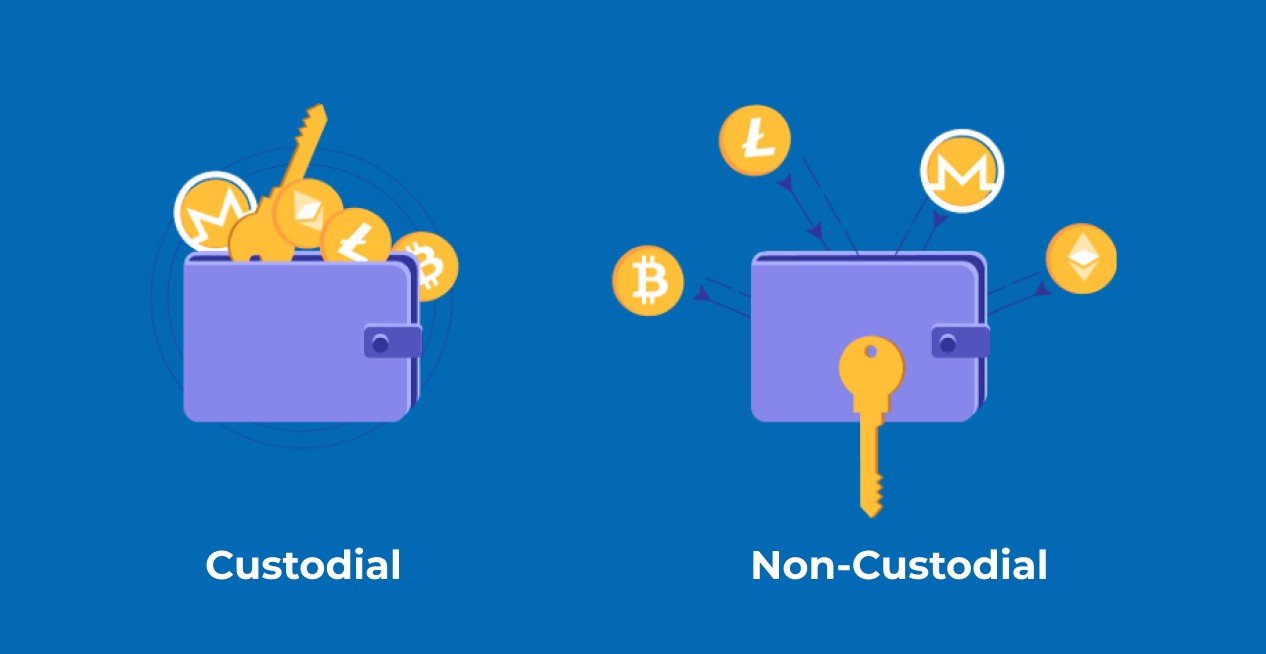In the exciting world of cryptocurrencies, your crypto wallet is your digital bank account. It’s where you store, manage, and interact with your digital assets. But just like traditional banks, there are different types of wallets, each with its own set of features and security considerations. One of the most critical distinctions is between custodial and non-custodial wallets. Let’s break down the differences to help you choose the right one for your needs.
Choosing the Right Crypto Wallet

Custodial Wallets: Convenience at a Cost
Custodial wallets are offered by third-party services, often cryptocurrency exchanges. Think of it like a traditional bank where the institution holds and manages your funds.
Pros:
- Ease of Use: Custodial wallets are user-friendly, often with simple interfaces and account recovery options.
- Convenience: You can access your crypto from anywhere with an internet connection, often through a website or mobile app.
- Recovery: If you lose your password, the provider can help you recover your account.
Cons:
- Trust: You entrust your funds to a third party, which means you need to trust them with your assets.
- Security Risks: Custodial services can be targets for hackers, potentially putting your funds at risk.
- Control: You don’t have full control over your private keys, which are essential for accessing and managing your crypto.
Non-Custodial Wallets: Taking Control
Non-custodial wallets put you in the driver’s seat. You are the sole holder of your private keys, giving you complete control over your crypto.
Pros:
- Security: You have complete control over your funds, reducing the risk of third-party hacks.
- Privacy: Non-custodial wallets offer greater privacy as you don’t need to share personal information with a third party.
- Control: You have full access to your private keys, giving you ultimate control over your crypto.
Cons:
- Responsibility: You are solely responsible for the security of your private keys. Losing them means losing access to your funds forever.
- Complexity: Non-custodial wallets can be more complex to set up and use, especially for beginners.
- Recovery: If you lose your private keys, there is no way to recover your funds.
Which Wallet is Right for You?
The best choice depends on your individual needs and priorities. Consider the following:
- Experience Level: Beginners might find custodial wallets easier to use, while experienced users may prefer the control of non-custodial wallets.
- Security Needs: If security is your top priority, a non-custodial wallet is generally recommended.
- Trading Frequency: If you plan to trade frequently, a custodial wallet on an exchange might be more convenient.
- Amount of Crypto: For large holdings, a non-custodial wallet is often preferred for greater security.
Conclusion
Choosing the right crypto wallet is a crucial step in your crypto journey. Understanding the difference between custodial and non-custodial wallets is essential for making an informed decision. Weigh the pros and cons carefully, consider your needs, and choose the wallet that best suits your individual circumstances.
Ready to start your cryptocurrency journey?
If you’re interested in exploring the world of crypto trading, here are some trusted platforms where you can create an account:
Binance: A global leader in cryptocurrency trading. -> Join Binance
Bybit: A user-friendly platform for both beginners and advanced traders. -> Join Bybit
BingX: Perfect for those looking to diversify their crypto investments. -> Join BingX
These platforms offer innovative features and a secure environment for trading and learning about cryptocurrencies. Join today and start exploring the opportunities in this exciting space!
Disclaimer: Always do your own research (DYOR) and ensure you understand the risks before making any financial decisions.
Contact for work: datnk710@gmail.com




